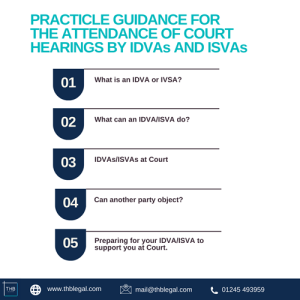Inheritance tax is changing in 2026
What farming families and business owners need to know If you own a farm,...- 11 February 2026
Posted: 24 April 2023
Practice Guidance has been issued in relation to new rules on the attendance of Independent Domestic Violence Advisers (IDVAs) and Independent Sexual Violence Advisers (ISVAs) at Hearings in the Family Court, which came into force on 6 April 2023.
IDVAs and ISVAs are independent advisors who work respectively with victims of domestic abuse or rape and/or sexual assault. The type of support provided will vary depending on the individual’s needs and situation. However the overall intention is to support a victim to rebuild their life. These advisors can further help victims access support from other agencies.
One such way that an IDVA/ISVA can support a victim is to accompany them to Court to give support, advice and help.

They have no right to act as a legal representative or McKenzie Friend, but they may support victims in a practical or emotional way.
IDVAs/ISVAs may also provide support for the victim to engage with the court process and out of court discussions. Even when they are not allowed in hearings, the victim has a right to their support at court before and after the hearing.
IDVAs/ISVAs do not have rights of audience and therefore may not address the court, examine witnesses, or manage the victim’s case in or outside of court.
Any party to family proceedings has a right for their IDVA or ISVA to support them at court, before or after hearings. However, the court has the power to refuse an advisor to be present in the hearing itself where it is satisfied that it would not be in the interests of justice. If the court decides the IDVA/ISVA should not be present during the hearing, it should give a judgment setting out its reasons, and the party seeking support may appeal the decision.
The accepted reason for denying an IDVA/ISVA is where that support might undermine or has undermined the interests of justice. This includes where the support in the court room is being provided for an improper purpose or is unreasonable in nature. The court must also be certain that the IDVA/ISVA is not directly or indirectly conducting the litigation and that they fully understand the duty of confidentiality.
The following are not reasons for denying support during hearings:
Any other party can object to the presence of an IDVA/ISVA at a hearing. It is down to the objecting party to provide sufficient reasons why the victim should not receive such support during a hearing. The victim does not have to justify why they are exercising their right to receive support.
The right to a fair trial is considered when deciding whether it is appropriate for an IDVA/ISVA to be present. The party objecting should clearly explain their objections, and the person receiving the support should be given the opportunity to explain why the IDVA/ISVA should continue to be present. The court has been advised to consider the issue carefully. It must only be in the interests of justice for the court to curtail a person’s right to have IDVA/ISVA support in hearings.
Any party who wishes for their IDVA/ISVA to support them should inform the judge as soon as possible. The advisor must provide their name and details of the organisation they work for, alongside an assurance that they understand the confidential nature of proceedings. They must indicate to the court which party they are providing support to and confirm that the party wishes them to be present. Any decision of the court to allow support from an IDVA/ISVA must be followed.
If you are interested in a confidential chat with one of our family law solicitors, or you would like further information on the services we offer, please call 01245 493959 or send an email.
- 11 February 2026
- 09 February 2026
- 07 February 2026